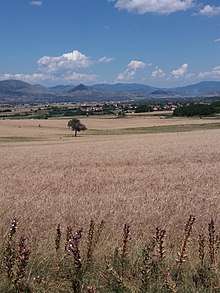Kalochori, Kastoria
Kalochori (Greek: Καλοχώρι, before 1926: Δοβρόλιτσα - Dovrolitsa,[1] Macedonian Slavic: Добролишта (Dobrolišta), Добролишча in the Kostur dialect, is a small rural village, part of the municipal unit of Mesopotamia, Kastoria regional unit, Greece. The village has an elevation of 681 meters above sea level. Kalochori is also located 14 kilometers away from the city of Kastoria and 14 kilometers away from the village of Nestorio. It had a population of 458 in the year 2001.

History
Ottoman Empire
According to Academician Ivan Duridanov, the etymology of the name is from the original patronymic of ishti, which comes from the personal name Dobrol
In the fifteenth century, the village had 140 names of households that were named.
Families from Dobrolishta, along with Slimnitsa and Omotsko, settled in 1791 and in the Nevrokop village of Kovachevitsa, where they formed the so-called Arnautska neighborhood. They are engaged in construction and founded the Kovachevitsa architectural-building school.
In the beginning of the 20th century, the entire Christian population of Dobrolishta was under the influence of the Patriarchate of Constantinople, but after the Ilinden uprising in the beginning of 1904 it was under the influence of the Bulgarian Exarchate.
The same year, Turkish authorities did not allow teacher A. Naumov from Aposkep to open a Bulgarian school in the village.
In October 1906 Ottoman forces succeeded in killing the voivode Nikola Dobrolitski and two of his chetniks in Dobrolishta
Greece
At the outbreak of the Balkan Wars in 1912, two people from Dobrolishta were volunteers in the Macedonian-Adrianople Corps.
During the Balkan wars, the village was occupied by Greek troops and remained in Greece after the Balkan Wars.
In 1926 Dobrolishta is changed to Kalohorion which translates to good village.
On May 4, 1945 Kalochori was pillaged by the Greek detachment of Andon Amanatidis, many women and men are abused. 13 children from Kalochori, are moved out of the country by the communist authorities as refugees to the Eastern Bloc during the Greek Civil War. There are nine political killings in the village during the Greek Civil War.
Censuses
- 1913 - 468 people
- 1920 - 434 people
- 1928 - 455 people
- 1940 - 634 people
- 1951 - 585 people
- 1961 - 520 people
- 1971 - 458 people
- 1981 - 475 people
- 1991 - 459 people
Notable Individuals
Vangel Mirkovski, (Evangelos Mirkopoulos), (1915 - 1949), - Communist, member of DAG and ELAS
Lazar Poplazarov- commander of an armed detachment of ELAS, editor of "Slavyanomakedonski Glas" newspaper, district leader of the SNLF, and general directorate member of the NLF.
Vasil Bruzho- a member of IMRO
Vasil Hristovski (1913-1948)- partisan, member of SNLF and NLF
Zissos Delovski, (Zisis Deliopoulos), - Communist, and head of the Northeast Committee of Kostursko, died in 1981
Zissos Kalimanov, (Zisis Kallimanis), (? - 1943), - Communist, arrested in Akronavlia, released in June 1941, was killed by an Italian patrol in Pelekanos
Ilia Tepov (1884 -?)- Macedonian-Odrin Opolechenitsa, Kosturka cheta
Ilia Tolev (Tolyov)- Macedonian-Odrin Opolechenitsa, Kosturka cheta
Mitre Kalimanov- Communist, brother of Pascal Kalimanov, during the Second World War leads a detachment of Ohrana, and then joins the SNLF
Nikola Dobrolitski (1876 - 30 October 1906)- IMRO revolutionary, grandfather of Yagnoula Kunovska
Paskal Kalimanov, (Pasxalis Kalimanis), - one of the leaders of the Ohrana in the years of the Second World War
Apostol Kalimanov- member of the Macedonian-Bulgarian committee.
Staso Chanakov Dobrolite - IMRO member
Todor Vlahov (1913 - 1946)- Communist, member of OKNE, CPG, and ELAS
Trpo Kalimanov (? - 1943)- Communist, member of the Communist Party of Greece
Todor Kalimanov, (Thodoros Kalimanis), - village leader
Yagnoula Kunovska (1943- )- a lawyer, politician, and artist in North Macedonia, granddaughter of Nikola Dobrolitski
Sterjana Vangelova (1924- )- participant in the Greek Civil War
Sterjo Kalimanov, (Stergios Kalimanis), - member of Ohrana